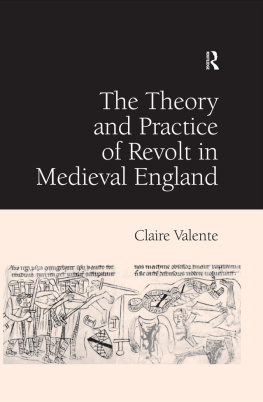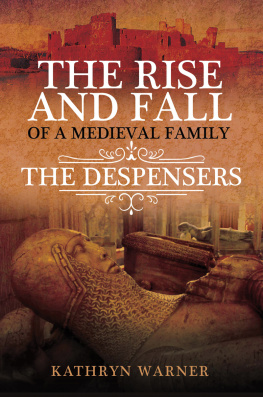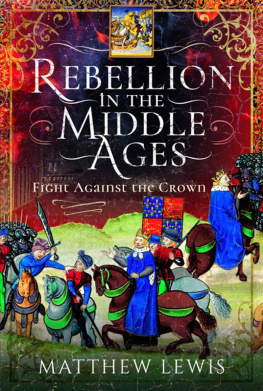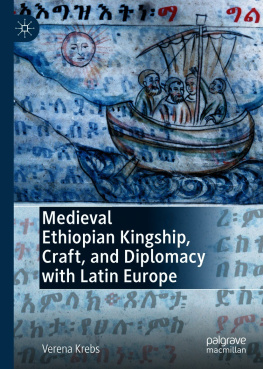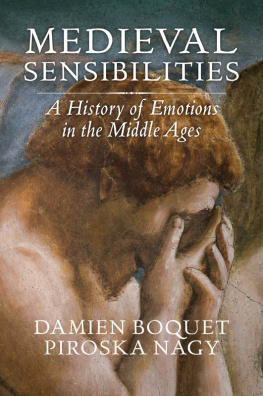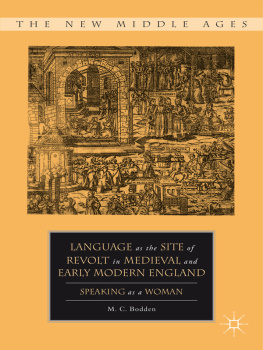THE THEORY AND PRACTICE OF REVOLT IN MEDIEVAL ENGLAND
For my parents
The Theory and Practice of Revolt in Medieval England
Claire Valente
First published 2003 by Ashgate Publishing
Published 2016 by Routledge
2 Park Square, Milton Park, Abingdon, Oxon OX14 4RN
711 Third Avenue, New York, NY 10017, USA
Routledge is an imprint of the Taylor & Francis Group, an informa business
Copyright Claire Valente 2003
The author has asserted her moral right under the Copyright, Designs and Patents Act, 1988 to be identified as the author of this work.
All rights reserved. No part of this book may be reprinted or reproduced or utilised in any form or by any electronic, mechanical, or other means, now known or hereafter invented, including photocopying and recording, or in any information storage or retrieval system, without permission in writing from the publishers.
Notice:
Product or corporate names may be trademarks or registered trademarks, and are used only for identification and explanation without intent to infringe.
British Library Cataloguing in Publication Data
Valente, Claire
The theory and practice of revolt in medieval England
1.Revolutions - England - History - To 1500 2.Nobility - England - History - To 1500 3.Great Britain - History - 13th century 4.Great Britain - History - 14th century 5.Great Britain - Politics and government - 1066-1485
I.Title
303.6'4'0942'0902
Library of Congress Cataloging-in-Publication Data
Valente, Claire, 1969
The theory and practice of revolt in medieval England / Claire Valente.
p. cm.
Includes bibliographical references (p. ) and index.
1. Great Britain--History--Medieval, 1066-1485. 2. Government, Resistance to--Great Britain--History--To 1500. 3. Peasant uprisings--Great Britain--History--To 1500. 4. Revolutions--Great Britain--History--To 1500. 5. Insurgency--Great Britain--History--To 1500. 6. England--Social conditions--1066-1485. I. Title.
DA175 .V35 2003
942.03--dc21
2002074463
ISBN 13: 978-0-754-60901-8 (hbk)
Why study revolt? This is a question which will be addressed in proper scholarly fashion in the introduction, but here I would like to suggest why I study revolt, why I have always found it fascinating. Those who know me well might suggest that I don't deal well with authority, so like all historians, I study myself. Perhaps this is true, but I also was inspired early on by Crane Brinton's Anatomy of Revolution, assigned by Mrs. Sherman for A.P. History. Brinton's work argued that people and societies show their true colors in times of great upheaval and taught me that history provides valuable lessons even if humans refuse to learn them. He convinced me that studying how past societies addressed power and community is essential to understanding our own society. Thirteenth- and fourteenth-century English rebels are not all worthy of emulation, but their successes and failures are illuminating and helped build the world in which we live.
In the ten years this book has been in the making, I have incurred many debts. First, to my parents, William and Elizabeth, who have doubled as unpaid editorial assistants as well as cheerleaders. Also to my siblings, Christina, Andrew, and Joseph. My many friends in graduate school and at the University of Portland: you know who you are and how much I love you. In particular, I am grateful to my colleague Elise Moentmann for taking over many of my duties this year so I would have more time to work on this book. Thanks to the staff at the P.R.O. (particularly at Chancery Lane, now of blessed memory) and at the libraries at Harvard and the University of Portland, for processing so many requests. To the Frank Knox Memorial Trust and the University of Portland for research funding and administrative support. To my editorial assistant, Alyson Barrett, my indexer, Martin Hargreaves and to Tom Gray, Frances Britain, and everyone at Ashgate, for helping get the book into print. Last, but certainly not least, to the many scholars who read the book in its various permutations and combinations, in particular my dissertation advisers, Thomas Bisson and Charles Donahue, to whom I owe more than I can express; Alan Cooper, Gretchen Starr-Le Beau, and Elka Klein, on whose friendship I trespassed all too often; and John Maddicott, Charles Wood, and Thomas Green, who provided enormously helpful criticisms despite having no particular obligation to do so. To all these give credit for the book's virtues; blame me for its flaws. In any case, I offer it, as with all my prayers, works, joys, and sufferings, to Jesus, through Mary.
- A.M. Annales Monastici, ed. H.R. Luard, 4 vols. (R.S., 1864-9).
- B.I.H.R. Bulletin of the Institution for Historical Research
- B.J.R.L. Bulletin of the John Rylands Library
- C.C.R. Calendar of the Close Rolls preserved in the P.R.O., 1272-1485 (London, 1892-1954).
- C.F.R. Calendar of the Fine Rolls preserved in the P.R.O., 1272-1509 (London, 1911-62).
- C.I.M. Calendar of Inquisitions Miscellaneous preserved in the P.R.O., 1216-1422 (London, 1916-88).
- C.I.P.M. Calendar of Inquisitions Post Mortem.preserved in the P.R.O., 1216-1418 (London, 1904-95).
- C.P.R. Calendar of the Patent Rolls preserved in the P.R.O., 1216-1509 (London, 1891-1916).
- C.R. Close Rolls of the Reign of Henry III Preserved in the P.R.O. (London, 1902-38).
- C.S.L. Calendar of Signet Letters of Henry IV and V, ed. J.L. Kirby (London, 1978).
- D.B.M. Documents of the Baronial Movement of Reform and Rebellion, 1258-67, ed. R.F. Treharne and I.J. Sanders (Oxford, 1973).
- D.I.C. Documents Illustrating the Crisis of 1297-8 in England, ed. Michael Prestwich (Camden Society, 4th ser., 24, 1980).
- E.E.T.S. Early English Text Society
- E.H.R. The English Historical Review
- Foedera Foedera, Conventiones, Literae, etc. ed. T. Rymer et al, 3rd edn., 10 vols. (The Hague, 1739-45).
- P.R.O. Public Record Office
- R.L.C. Rotuli Litterarum Clausarum, ed. Thomas Duffy Hardy, 2 vols. (Record Commission, 1833-44).
- R.L.P. Rotuli Litterarum Patentium, ed. Thomas Duffy Hardy (Record Commission, 1835).
- R.P. Rotuli Parliamentorum, 6 vols. (Record Commission, 1767 -77).
- R.S. Rolls Series
- Statutes The Statutes of the Realm, 11 vo1s. (Record Commission, 1810-28).
Chapter
Why Study Revolt?
My God! this is a strange and fickle land, which has exiled, slain, destroyed, and ruined so many kings, so many rulers, so many great men, and which never ceases to be riven ... by dissensions and strife and internecine hatreds.
N'ont pas Anglois souvent leurs rois trays?
Certes ouyl, tous en ont congnoissance.
(Have not the English often betrayed their kings? Of course, we all know that).
Medieval Englishmen were treacherous, rebellious, and killed their kings, according to the fourteenth-century English king, Richard II, and a host of fifteenth-century French observers. This opinion, though biased, was not without factual basis. In the period from 1215 to 1415, five out of eight kings fought wars with their subjects; four out of eight were captured and/or deposed, and two were killed. Two others escaped open warfare but encountered vigorous resistance or conspiracy. These dramatic episodes-the imposition of Magna Carta on King John, the murder of Edward II, the 'abdication' of Richard II-have captured the imagination of professional historians, political theorists, poets, dramatists, and artists, as well as the general public, for centuries.

